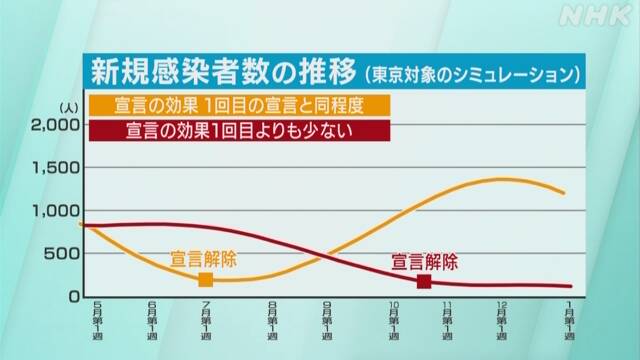A group of economists at the University of Tokyo has published the latest simulation results on the effects and economic impact of a state of emergency associated with the new coronavirus.
The group points out that "it is better to implement strong regulations for a short time overall."
This simulation was published by a group of Associate Professor Taisuke Nakata and Specially Appointed Lecturer Daisuke Fujii of the University of Tokyo Graduate School of Economics. We calculated the relationship between the infection situation and the impact on the economy.
In the simulation, the infectivity of the mutant virus was 1.4 times higher than before, and the effect of the declaration was assumed to be about the same as the first declaration last spring.
As a result, in Tokyo, if the declaration is lifted when the number of newly infected people falls below 500 per day in the fourth week of May, the number of infected people will start to increase again, and a state of emergency will be declared in mid-July. It was calculated that it would reach the required level, and the economic loss was about 3.5 trillion yen.
If the declaration period was extended and canceled when the number of people fell below 200 in the first week of July, the number would exceed 1000 in the third week of October, but as expected, it will be applied to the elderly. If the vaccination progresses, the burden on medical care will be reduced, and the result will not reach the level of issuing a declaration.
The estimated economic loss is more than 3 trillion yen, which is about 500 billion yen less than when the declaration was canceled with 500 people.
On the other hand, assuming that the effect of the declaration is less than the first one last year (*), the number of infected people in Tokyo will not increase, but will remain unchanged, and it will be the first in September to fall below 500 people a day. It was calculated that it would take up to a week.
Furthermore, it was the third week of October that the number of people fell below 200 a day, and if the declaration was continued up to that point, the economic loss would have been more than 4.3 trillion yen.
Associate Professor Nakata said, "It is better to implement strong regulations for a short time than to keep loose regulations for a long time. I think that the number of people last week did not decrease as much as last May, so the number of infected people has leveled off. , I'm worried about the situation where the state of emergency continues to flutter. "
The research group updates the simulation information on its website every Tuesday.
* Assuming the average economic activity = effect of the economic activity in May last year and the economic activity in January this year

